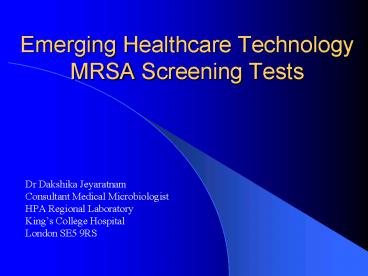Emerging Healthcare Technology MRSA Screening Tests PowerPoint PPT Presentation
1 / 28
Title: Emerging Healthcare Technology MRSA Screening Tests
1
Emerging Healthcare TechnologyMRSA Screening
Tests
- Dr Dakshika Jeyaratnam
- Consultant Medical Microbiologist
- HPA Regional Laboratory
- Kings College Hospital
- London SE5 9RS
2
Background
- Need for faster MRSA results
- PCR tests (rapid)
- Result in 2 hours
- Costly 144,000 v 720,000
- Trial of rapid testing v conventional culture
- for MRSA screening
3
Setting
- London teaching hospital
- 1200 beds
- 10 wards
- Medicine (elderly care), surgery, oncology
4
Design
- Randomised, un-blinded, cross-over study
- Control
- All patients screened on admission discharge
- Conventional culture
- Intervention
- PCR (rapid) MRSA test on admission
- Infection control initiated as per rapid result
- Otherwise as control
5
MRSA screening
- Culture MRSA selective broth Chromagar
- PCR test BD-MRSA
- Anatomical sites
- Nares, axillae groins (pooled)
- Skin breaks
- Other clinically indicated sites
6
MRSA control
- National guidelines
- Surgical pre-admission screening
- High-risk MRSA pre-emptively isolated
- MRSA Positive
- Results phoned to ward. Ward visit a.s.a.p.
- Decolonisation therapy
- Cohort or isolation
- Surgical patient defer if OP. Prophylaxis
7
Study strategy
- Real world NHS
- No change to infection control
- No change to reporting results
- No involvement of test manufacturer
8
Primary outcome
- MRSA acquisition rate
- MRSA acquisition
- A patient who became MRSA culture positive on
screens/specimens taken gt48 hours after admission
and 48 hours after discharge
9
Secondary outcomes
- MRSA acquisition rate/1000 patient-days
- MRSA transmission rate
- MRSA wound infections (culture ve)
- MRSA bacteraemias (culture ve)
- Appropriate/inappropriate isolation-days and
open-days (isolation facilities)
10
Criteria
- Included
- Valid screening specimens within 48 hours of
admission and discharge - Excluded
- MRSA positive on admission
11
Analysis
- Unadjusted odds ratios
- Adjusted OR pre-defined confounders age, sex,
ASA, ward, length of stay - Confounders included in logistic regression
12
Results
13
Flow of the study
- Date
- 0204/06 05/0610/06
11/06 12/0605/07
Intervention Plastics ENT Elderly care Vascular
surgery Oncology
Intervention Elderly care Urology
Cardiothoracic GI surgery Oncology
Randomisation
Baseline
Control Elderly care Urology Cardiothoracic GI
surgery Oncology
Control Plastics ENT Elderly care Vascular
surgery Oncology
14
Results
- 6888 patients included in total
- Control arm 3335 (81.4)
- Intervention arm 3553 (83.1)
- BD-MRSA test
- Sensitivity 87.8 Specificity 96.3
- NPV 99 PPV 55
- TAT culture 46.4hr, rapid 21.8 hr (plt0.001)
15
Baseline characteristics
16
Main outcomes
17
Results
- No difference
- Individual wards
- Bacteraemia or wound infection rates
- Multivariate analysis
OR 0.85 (0.65 1.13, p0.26)
18
Isolation facilities
19
Conclusions
20
Universal, MRSA PCR admission screening
- Significantly reduced
- Test turn around time
- Inappropriate pre-emptive isolation days
- Did not significantly reduce
- MRSA acquisition, bacteraemia or wound infections
21
(No Transcript)
22
SICU
High risk culture admission pre-emptive
isolation
All PCR admission culture discharge
pre-emptive isolation
3.66/1000 pt-days
4.45/1000 pt-days
RR 1.0 (0.6 1.7,p 0.97)
Imported carriage rate 6.7
23
MICU
All as before plus pre-emptive isolation
All PCR admission culture discharge
High risk culture admission
2.7/1000 pt-days
4.52/1000 pt-days
RR 0.3 (0.1-0.7, p 0.004)
Imported carriage rate 6.7
24
Conclusions
- Universal rapid MRSA screening has no significant
impact on MRSA acquisitions where there is - Good infection control
- Pre-emptive isolation
- Pre emptive isolation
- Is more rapid than any laboratory test
25
Questions
- Is pre-emptive isolation practical?
- Does it allow efficient side room use?
- Are point of care tests a better solution?
- Newer technology
- e.g. Cepheid GeneXpert, Blaze Ventures
- Two centre study 2010
26
New MRSA Screening TechnologiesConclusions
- Some surprising results
- Clarify the benefits role of new technologies
- Cost benefit analysis
- Determine best strategy for MRSA screening
27
Acknowledgements
- Professor Gary L French
- Professor Christopher J Whitty
- Staff and patients of Alan Apley, Aston Key,
Blundell, Dorcas, Henry, Hedley Atkins, Luke,
Page, Samaritan and Stanley wards, and the
Surgical Admissions Lounge - Katie Maunders, Dongmei Liu, Chrissie Orezzi,
Uchechukwu Ajokwu, Florence Bunting, Sarah Sacks,
Ghasem Yadegharfar - Department of Infection, EPR, Performance
Management, Human Resources GSTT - UK Department of Health
28
(No Transcript)

